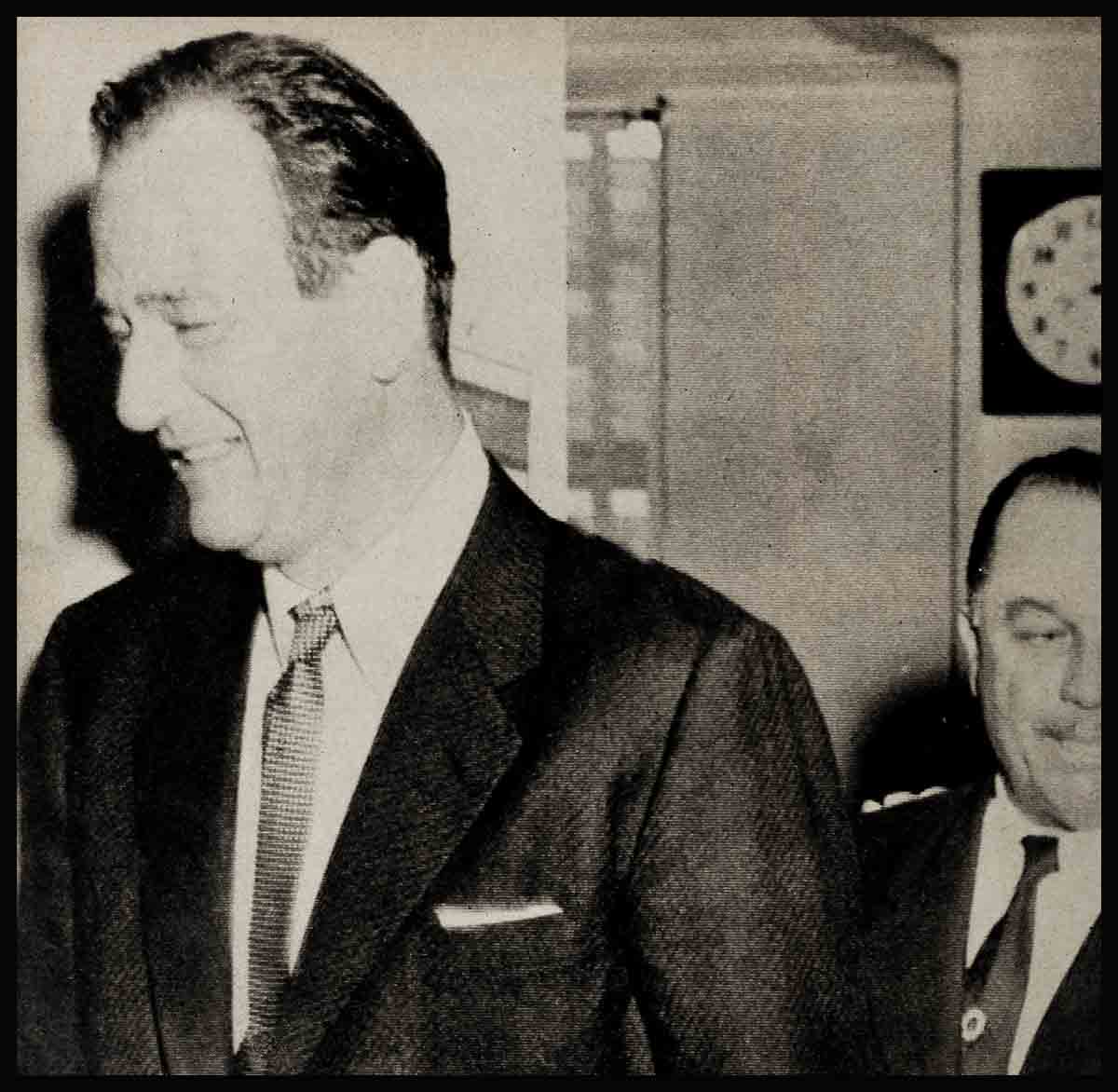
What Really Happened At The John Wayne Divorce
A few months ago when the sensational divorce trial of John “Duke” Wayne versus Esperanza “Chata” Wayne began, it was expected that this headlined case would last at least five weeks, so extensive, lurid and detailed was the planned mudslinging. Both Chata’s lawyer and Duke’s lawyer had filed lengthy bills of particulars.
Chata said that Duke, after drinking to excess, had frequently struck her without provocation. Wayne said his wife was all wet, that she “has consumed intoxicating liquors in such amounts that she frequently became intoxicated and was thus prevented a great portion of the time from properly attending to the customary household duties ordinarily performed by a wife.”
The lank, lusty, forty-six-year-old actor also charged his wife with:
1. Staying out all night.
2. Sleeping until three and four in the afternoon.
3. Spending his money on drinks for strange men.
4. Gambling in Las Vegas to all hours of the morning and then returning home with swollen ankles.
5. Falsely accusing him of striking her.
6. Impolite, discourteous behavior.
7. Periodic intoxication..
8. Extravagance and viciousness.
9. Against his protests and without justification, walking out on their marriage for long periods of time.
10. Drinking bouts and fisticuffs with her mother.
11. Feigning illness and claiming to be in a highly nervous and exhausted state.
12. Staying out all night and returning the next morning with grass stains on her clothes.
13. Entertaining a male guest for one week at their residence in California while Mr. Wayne was working on a film in Honolulu.
14. Going to Mexican night clubs with men other than her husband and drinking excessively.
All of this, Duke charged, caused him such “grievous mental suffering, embarrassment, and humiliation” that he wanted a divorce at once.
Chata, his thirty-one-year-old Mexican wife, charged America’s number-one movie attraction with:
1 Pulling her out of bed and beating her.
2. Dragging her down the hallway of the Del Prado Hotel in Mexico City by the roots of her hair.
3. Blacking her eye.
4. Calling her obscene names.
5. Manhandling her in the presence of guests.
6. Swearing at the servants and thereby causing her great pain and humiliation.
7. Refusing to escort her home from parties.
8. On occasions too numerous to specify covering her body with bruises which her masseuse might readily see.
9. Excessive drinking and resultant intoxication.
10. Violent temper and bad manners.
11. Going out with actress Gail Russell on a party and not returning home until the wee hours of the morning.
12. Giving Gail Russell money for a new car.
13. Throwing towels all over the dressingroom of their residence because he was dissatisfied with the number of towels in his bathroom.
14. Belligerent attitude and demeanor which once manifested itself when at a party he tossed his wife’s shawl into the mud.
15. Attending a stag party where call girls were brought in and strip teases performed; “and when defendant returned home in the early morning hours, he was very intoxicated and had a large black bite on the right side of his neck.”
16. Throwing alcohol in her face.
17. Forcing her to escape into another bedroom, screaming and calling her vile names through the door.
18. Without her consent, moving her effects out of their large residence in Encino into a small Beverly Hills apartment.
Despte all this potent ammunition, the Wayne trial ran only three days.
What happened? Who called a halt to the proceedings and why? Why, after weeks of fruitless out-of-court bickering, was a financial agreement satisfactory to both parties reached in a matter of hours?
Before they went into the courtroom Duke Wayne had offered his wife $40,000 for two years and $35,000 a year for the next seven years. He had insisted that there was no community property to divide because Chata, in their seven years of marriage, had spent more than he had earned. Chata, in turn, had demanded approximately $9,000 a month in alimony. Whereupon Duke had said, “I hate to do it, but ’m going to fight this one through.”
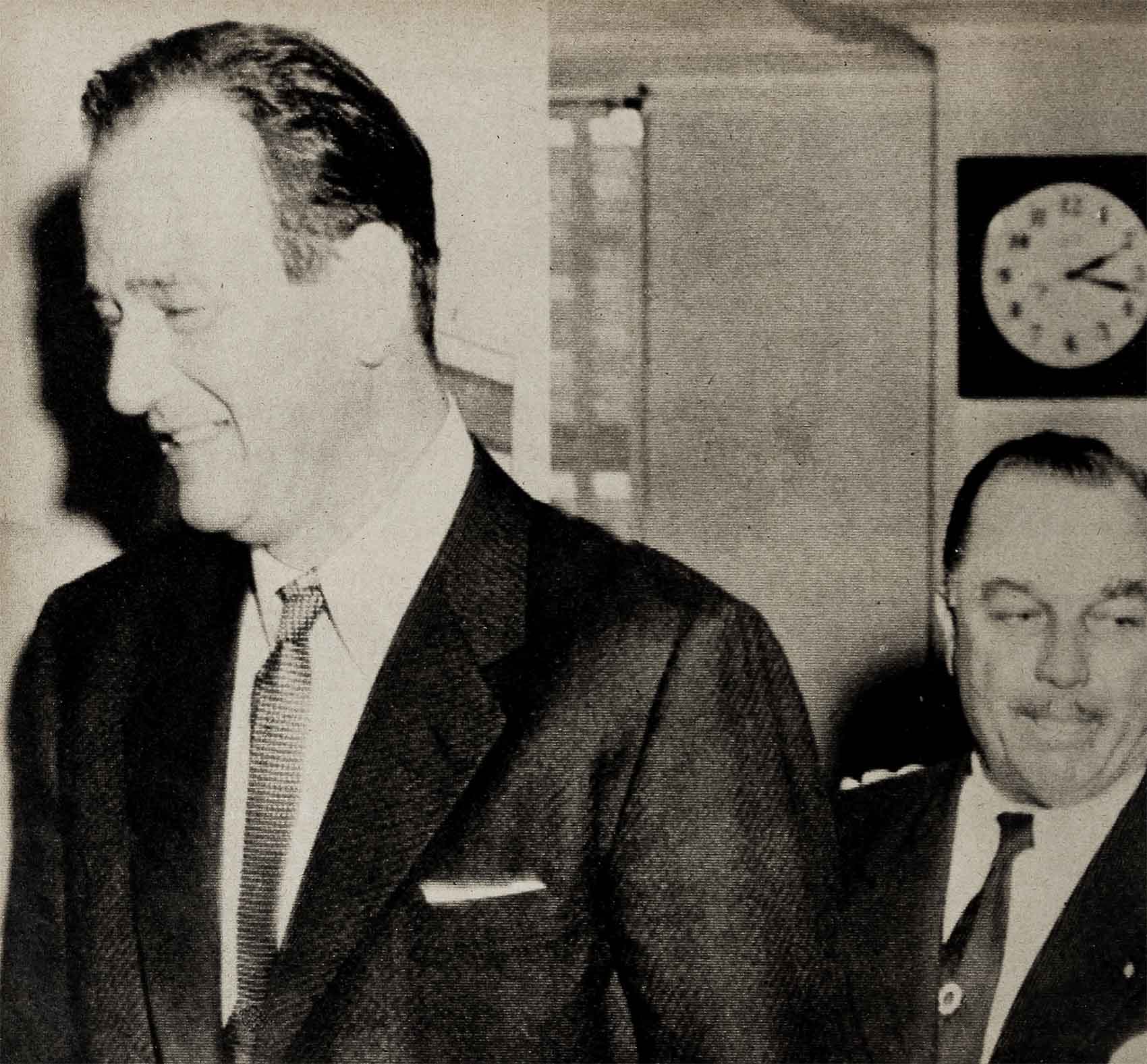
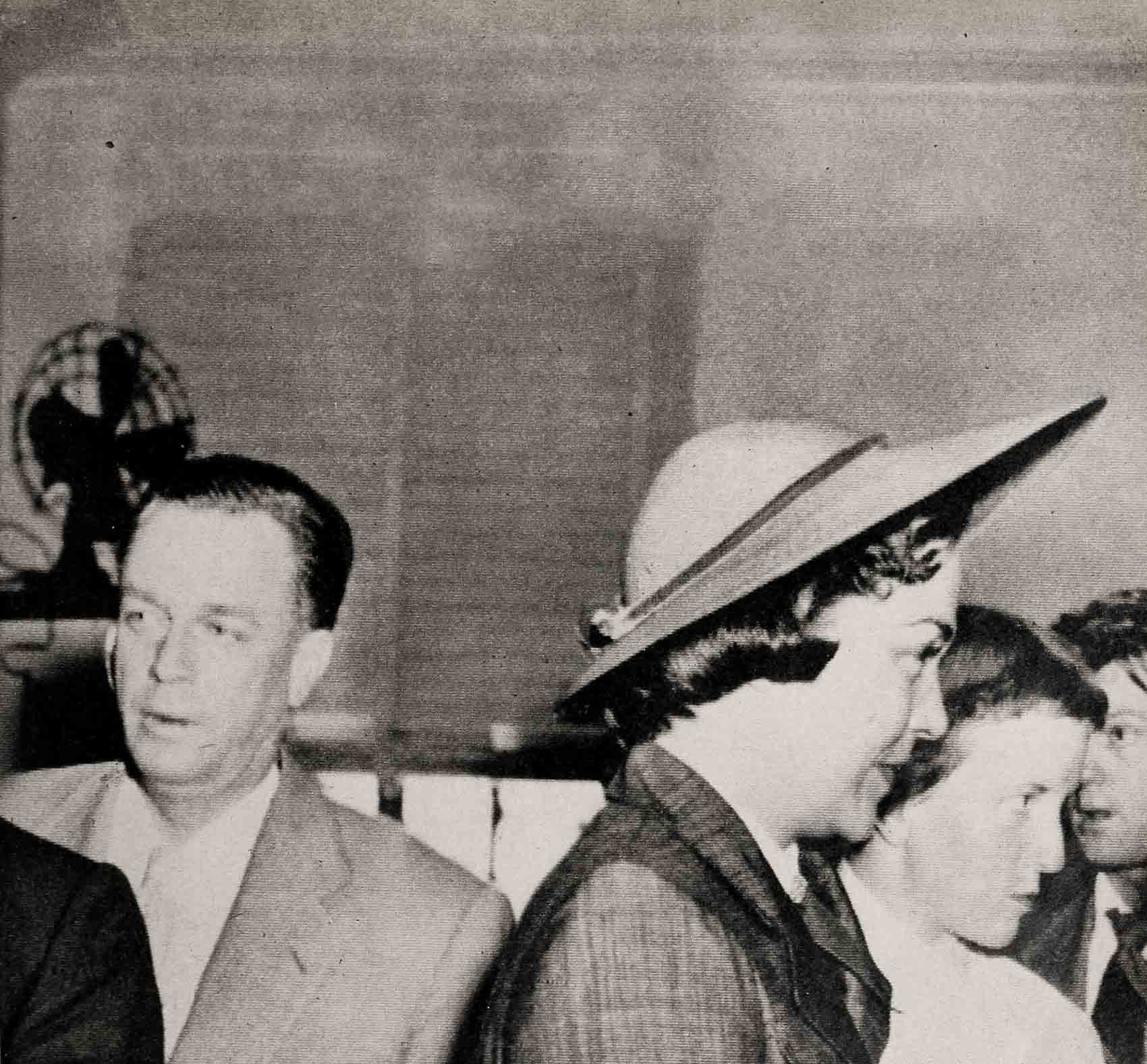
MODERN SCREEN is the only magazine with the inside story of the Wayne case—why it wasn’t battled out according to plan, why the trial was cut short and how the settlement was reached.
On the morning of the trial’s third day, half an hour before Duke, Chata, the lawyers and witnesses were scheduled to appear in Judge Allen Ashburn’s courtroom, Lloyd Shearer, a writer who was covering the trial, rapped on the door of the judge’s chambers. He introduced himself to Judge Ashburn, a stern-looking bespectacled man of sixty-eight, and asked permission to use a noiseless wire recorder while Mr. and Mrs. Wayne were testifying.
“I’m very sorry,” Judge Ashburn said kindly, “but if I let you use a recorder, then I’ve got to let the newsreel men come in and the TV men come in, and the whole thing will become a circus. It’s hard enough to keep order as it is.”
Mr. Shearer nodded. “I know, Your Honor,” he conceded, “but the recorder doesn’t make any noise. I also know both of the principals in this case, and neither of them has any objection.”
Judge Ashburn ran a hand through his short iron-grey hair. “If you know them,” he said good naturedly, “why don’t you get them to settle this mess?”
The writer then agreed that the case was getting out of hand and he said, “The terrible part of it all, Your Honor, is that nothing is involved but money. If children were involved or a matter of principle were concerned, I could see a last-ditch fight. But to parade this sort of evidence because the wife wants more money and the husband won’t give it to her seems pretty senseless.”
Judge Ashburn expressed the opinion that both Duke and Chata had employed competent counsel. He assumed that every effort had been made to settle their clients’ differences out of court.
“There’s no doubt about that, Your Honor,” Shearer said. “They were pretty close to a settlement at one time. I still think, however, that if somebody puts his foot down and insists that a settlement be reached, such a deal can be made.” The writer asked once more for permission to use his wire recorder, and again the judge denied him.
Fifteen minutes later when Chata Wayne strode into court—she was late because she’d been stopped and ticketed for speeding by a highway patrolman—she learned that her lawyer and Duke’s lawyer, Frank Belcher, were closeted in chambers with Judge Ashburn.
What Ashburn said in essence to both lawyers was that the case was taking a nasty turn and that he felt a property settlement could be reached if all the parties concerned really got down to business. He was recessing court until two o’clock that afternoon, and he wanted both lawyers to return with a settlement.
While court was recessed, Duke, Chata, their two lawyers, and Bo Roos, Duke’s business manager, succeeded in making their way into an adjoining court room. The door was locked and the final settlement conference began.
There was much haggling over financial details. Chata wanted her debts to be paid. She insisted upon having her community property rights recognized.
In the end, Duke agreed to pay Chata approximately $50,000 a year for the next six years, to pay all of her debts (estimated at $22,000), sell the property they own and give her half the proceeds and pay her legal expenses. The settlement ran to $500,000 give a little, take a little.
One reason Duke wanted to settle was that he was afraid his two oldest children might be subpoenaed and asked to testify against their father.
Duke felt sure that if the trial continued, his children would be forced to share his humiliation, that they would be compelled to answer the most soul-searing personal questions, that the battery of photographers and newsmen would descend upon them and that the two children, Mike, eighteen, and Tony, sixteen (the daughter’s name is Mary Antonia but everyone calls her Tony), would bear the stigma of this experience and would carry the memory forever.
He was determined to avoid this no matter what the price in cash or future financial indebtedness.
What he did not and could not know was that before the trial got underway, Chata had emphatically told her lawyer, Jerry Rosenthal, “I love Duke’s children, all four of them. They are fine children, and under no circumstances must they be called or connected with this trial in any way. If Duke wants to fight, I’ll fight him. I’ll fight him all the way. But those children are not to be called. Is that understood?”
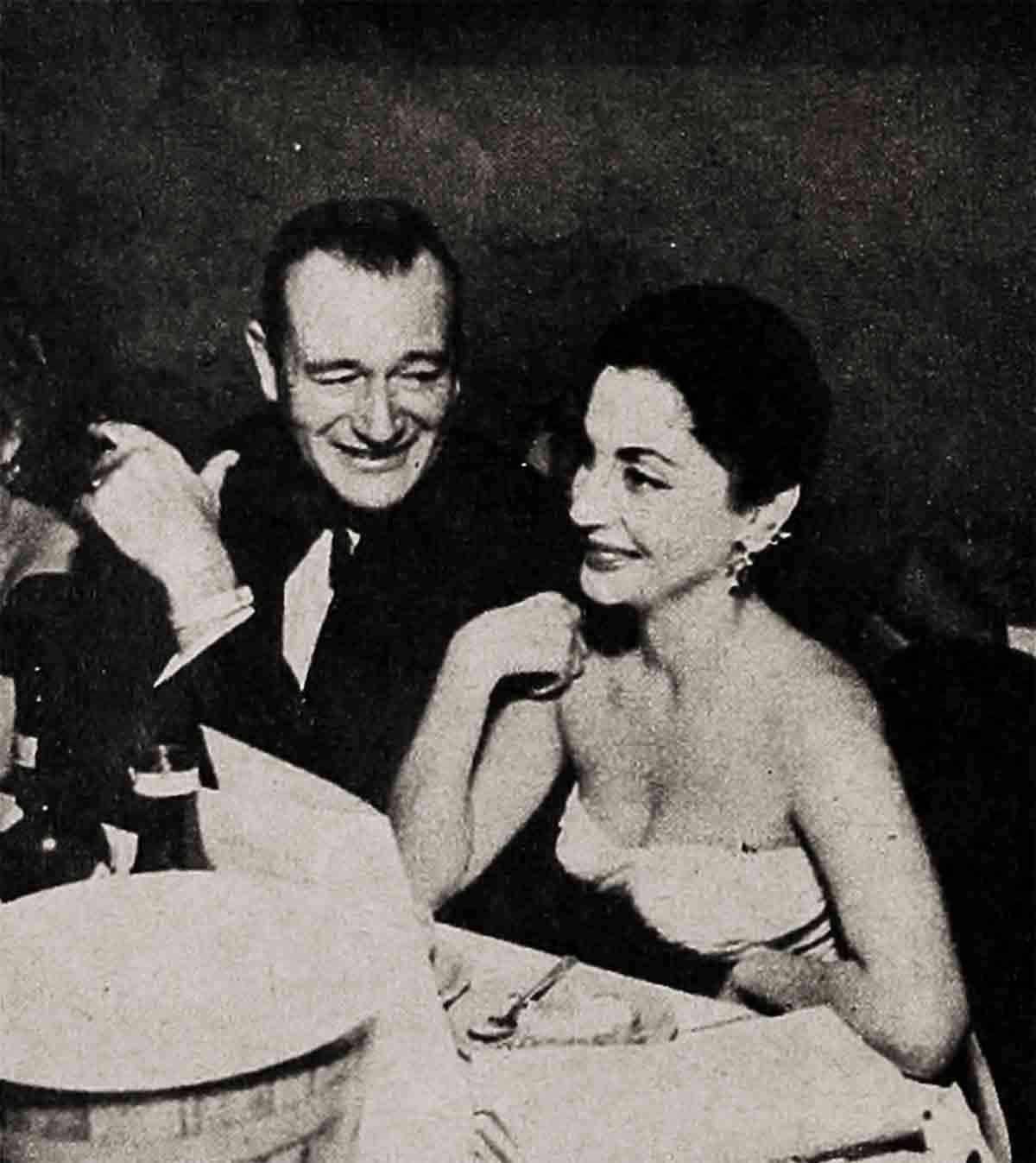
“I agree with you 100%,” Rosenthal had said. “They will not even be mentioned.”
“Good,” Chata said. “I will fight him alone.”
And what a fight this fiery Mexican lady put up. Sparks flew the very first day she and her lawyer stalked into court. The lawyer, shrewd, boyish-looking, well dressed, painted his client as a frightened, innocent young girl from Mexico who came to Hollywood only to find herself enmeshed in an alcohol-saturated net.
“Are you going to show,” the judge asked, “that her husband taught her to drink?”
“I surely am,” Rosenthal said. “She was swept into a mode of living where life came from the mouth of a whiskey bottle.”
He offered to prove that naive Chata one to the United States and lived with her “hard-drinking” actor for two years while he was still married, technically, to his first wife, Josephine Saenz, the mother of his four children.
Chata Wayne then took the stand. She was dressed conservatively in a dark blue suit ($165) a white and blue pin-striped blouse ($15.95) and white gloves ($2.98). She toyed nervously with her fingers as in an almost inaudible voice, she told of Wayne’s alleged mistreatment.
Here are random excerpts from her testimony:
“In December, 1946, we went to Honolulu with friends (Mr. and Mrs. Jimmy Grant. Grant is Wayne’s writer) . . . We were at the Grants’ suite at the Moana Hotel. Mr. Wayne was intoxicated. Mr. Grant was even worse. They were talking and I was tired, so I lay down on a twin bed.
“Mr. Wayne grabbed me by the foot and dragged me to the floor. I said, ‘What’s the matter?’ He just insulted me and berated me and I cried. I was so upset. My eyes were swollen from crying and I was unable to go to another party we were supposed to attend. Mr. Wayne later apologized and asked me to forgive him.”
“What did you say to that?” Rosenthal asked.
“That I would,” Chata replied. “And then I said, ‘If that’s what liquor does to you then you shouldn’t drink so much.’ He said he would never strike or swear at me again.”
But not long after when they were in Mexico City where Wayne was producing The Bullfighter And The Lady,they were staying at the Hotel Del Prado, and one night, “He grabbed me and threw me against the wall and pulled my hair. He kicked me, then dragged me the full length of the corridor. He called me terrible things and punched me in the eye. Next morning my eye was black and swollen. I wore dark glasses to hide it.”
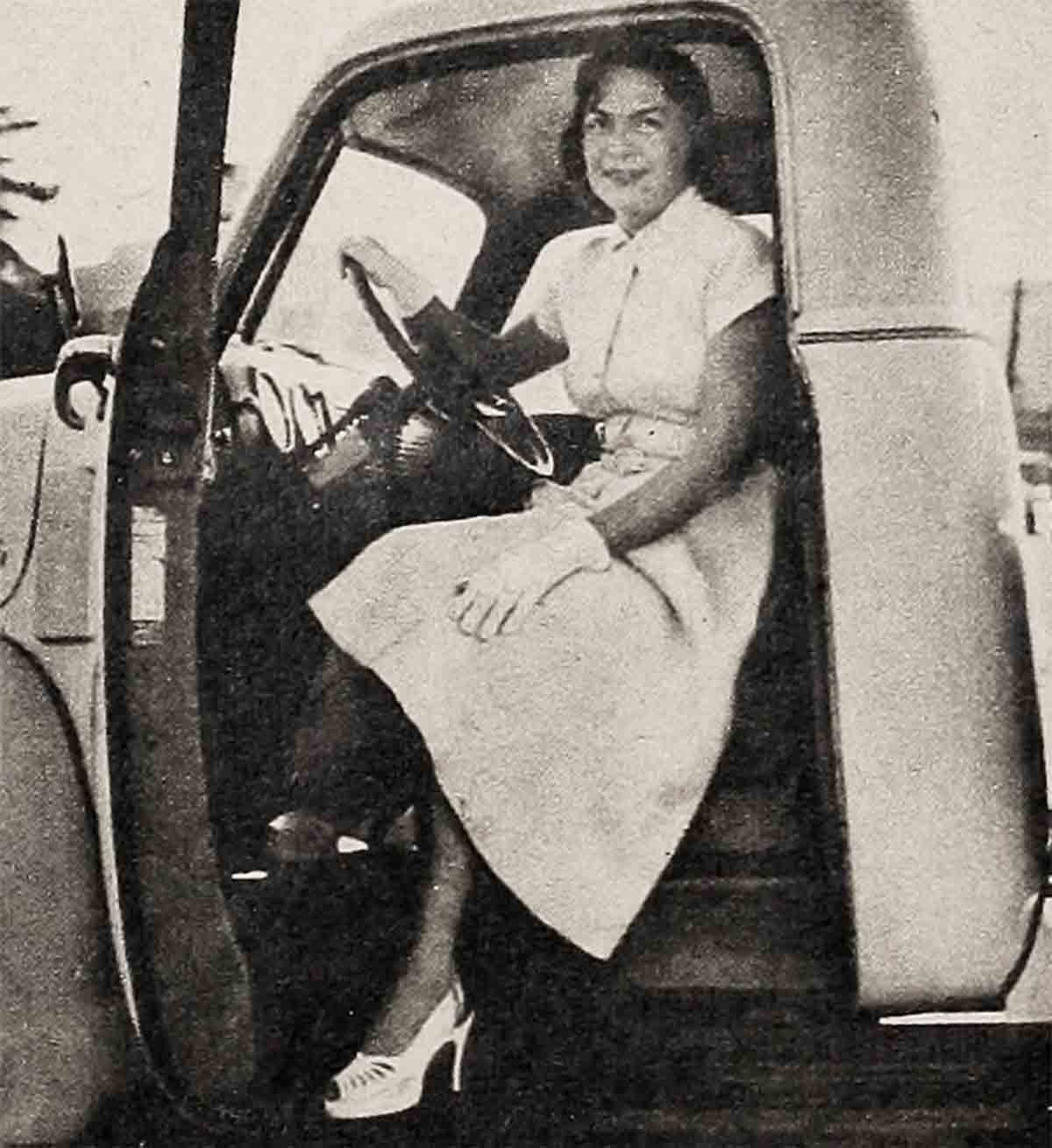
While Chata was testifying in this nostalgic vein, Duke was shaking his head. He looked around as if to say, “Where is she getting this stuff?” During periodic recesses, he said, “She must be awfully nervous, or maybe she doesn’t feel so well. There’s no other reason why she should be making up these stories.”
Chata wanted more money than Duke was willing to pay, and she was determined to prove that life with the handsome actor had been no bed of roses and that she was entitled to a high standard of separate maintenance. Any sum from $9,000 to $13,000 a month would do.
At the home of actor John Carroll, she testified, she once made the mistake of objecting to Wayne’s drinking, “So he knocked me down, hit me while I was on the floor, and kicked me. I was completely bruised the next day. And quite upset, of course. I was sore all over and had to stay in bed.”
Their first separation came in December, 1951, after they had fought all over Acapulco, Mexico. “He threw a glass of water at me, and then I threw a bucket back at him. Then he threw rubbing alcohol straight into my eyes. It blinded me for a moment and I said, ‘That wasn’t water.’ And he laughed and said, ‘Of course it wasn’t water. It was alcohol.’ I stumbled into the bathroom and splashed my eyes to see. The next morning I packed and left for Mexico City.”
On another occasion, Chata testified, she almost shot her husband when he broke a glass panel and let himself into their home in the early hours of the morning after spending much of the night with actress Gail Russell. She thought he might be a robber.
“I asked him if he had been at a motel,” she said, “and he said no, that he had actually gone to Miss Gail Russell’s house with her alone and spent the night there. He said he left the restaurant with Miss Russell—just the two of them—and went ‘straight to her house.
“I was quite hurt and very upset for two or three days. He apologized but didn’t explain why he had done it and asked me to make up.”
She then told Duke that she had been given a tip that he had given Gail Russell a new car, and she wanted to know if that were true.
“He said he had given her the down payment. I wondered why unless there was some relation between them, some friendship or closeness. He said there was nothing wrong and that he wasn’t running around or going with Miss Russell.
“I told him it was very strange that he would spend the night with her and give her a down payment on the car.”
“And what did Mr. Wayne say at this point?” Chata’s lawyer asked.
“He said,” she replied, “that I shouldn’t be upset about it.”
When Chata finished testifying, one little old lady sitting in the rear of the courtroom, turned to her friend and reflected the general opinion of the fans who had crowded the quarters. “I don’t believe a single word that woman has said,” she whispered.
Duke Wayne was prepared to take the stand and tell his side of the marital dispute when Judge Ashburn sent for the lawyers and ordered them to reach a final property settlement.
Once it was announced that a settlement was reached, the case was postponed for a week so that the final agreement might be couched in the proper legal terms.
One week later, the property settlement signed and sealed, all the principals returned to the nineteenth floor of the Los Angeles City Hall Building.
This time Chata had amended her plea to include a divorce. She no longer wanted separate maintenance. She wanted to be rid of Duke, and he wanted to be rid of her.
Now that a settlement had been reached and Chata was willing to give her husband a divorce, everyone wondered if Duke would take the stand and elaborate on all the charges he had made against his wife. Or would he say just enough to get a decree on mental cruelty grounds?
Lloyd Shearer, who had been instrumental in bringing about the financial settlement, asked him, “You going to blast her, Duke?”
Wayne shook his head indecisively.
“If I were you,” Shearer said, “I wouldn’t. Why put yourself in the same mudslinging category. Why don’t you just tell the judge that you could say plenty but that you’d rather not. Just give one or two examples of mental cruelty.”
“I wish to God I could,” Duke Wayne said. “I hate this. The whole mess is repugnant to me. I didn’t want any of it. You know that. I offered to give her every buck I could afford, but she was really unreasonable.
“If she had merely testified against me, that would be a different matter. But getting up on that stand and making white look black, dragging in my friends—someone like Gail Russell. You know Gail. The poor kid went to work for us on a loanout from Paramount. She was getting practically nothing. She did such a good job in our picture that we tried to get her some of the loanout money but Paramount said no soap. So what happened? Jimmy Grant—it was the first picture he’d directed—he and I chipped in $500 a piece and gave it to her. Chata knew all about it. Jimmy and I had discussed it half a dozen times.
“Sure I took Gail home after a party. But her folks were there and her brother came in. This attempt to make everything look dirty! I hate to do it, but I’m going to take the stand and tell what really happened. I’ve got an obligation to defend my friends, and I’m going to do it.”
But on this final day of the trial, it was Chata who took the stand first. Having obtained the settlement she wanted, her testimony was now brief and generalized: “He caused me physical and mental grief. I got sick several times. I went to the doctor regularly, and he said there wasn’t—well—there wasn’t much he could do for me.”
It was now Duke’s turn.
He was sick with the flu, and his glassy blue eyes showed it. He took the stand and not once in the next forty minutes did he ever sit comfortably on that chair. He leaned forward all the time, playing with his USC ring or his gold king of hearts cuff links and rubbing his left eye. Once in a while when he couldn’t find the right word, he snapped his fingers impatiently.
Of his wife he said, “She put me in a position where I had to cover up the fact that she was not acting like my wife. I had to keep up the public relations for us. It was humiliating to have her get drunk, fall down in cafes, cause disturbances at private parties. It affected my work and embarrassed me on many occasions.”
One time, Duke testified, after Chata had had too many drinks and called the police, he said to her, “Chata, you are really acting like a bum.”
Another time, he continued, when she was drunk and dancing with Bill O’Connell at Charley Foy’s Supper Club, she slipped and fell to the floor and then accused Duke who was twenty feet away, sitting at a table, of having thrown her down.
Of his evening with Gail Russell following the party celebrating the completion of their picture, Angel And The Badman, Wayne said:
“I offered to drive Miss Russell home in her car. We were following some friends who wanted to stop in a bar for a drink. We lost them in traffic and couldn’t find them again. We looked in several bars, then wound up at Carl’s cafe on the beachfront.
“We had some food and I saw some old friends from Glendale where I went to high school. They called me Marion (Wayne’s real name is Marion Mitchell Morrison) and then an artist did a charcoal drawing of Miss Russell, and I took her home. Her mother was there and we talked. I took a cab home at about one A.M.
ATTORNEY: Were there any improprieties between you and Miss Russell?
WAYNE: Absolutely not.
ATTORNEY: Were you together at a motel any time that evening?
WAYNE: Absolutely not.
ATTORNEY: What happened when you arrived home?
WAYNE: All the doors were locked. I could hear Chata and her mother inside z-zz-, buzzing all the time, and I said, “Come on, Chata, open the door.” But she wouldn’t. I rang the bell and she still wouldn’t open up. Finally, I broke a glass pane, unlocked the door and went in. I lay down on the seven-foot sofa in the living room. Mrs. Wayne and her mother were in another room blabbing, blab, blab, blab. Then they came charging in with a .45. They talked it over for a few minutes. Then they left.
Wayne was then shown a typewritten list of profanities which he supposedly employed to call his wife from time to time. He studied the list for a moment and then agreed he had called her a couple of them on occasion, but nothing else.
He said, “She had nothing to do but see that the servants kept the house in order and she wouldn’t do that. Sure, I got irritated when I stepped out of the shower to find that I had no towels. So I sneaked into her dressing room and took all her towels so she wouldn’t have one when she got out of her shower. It was kind of silly, I guess, but I was sore.”
As for having “sloshed” his wife in Mexico with alcohol, Duke admitted that one, but only after she had doused him with a bucket of water. “She started to charge me, and I said, ‘Chata, so help me, if you come closer I’m going to slosh you with this alcohol,’ and she came at me, so I sloshed her, and she ran out crying.”
And then Wayne threw the bombshell of the case. After he returned from Honolulu in June of last year, he testified, his butler, Hampton Scott, came up to him and said, “Mr. Wayne, are you sure you’re through with Mrs. Wayne?”
When Duke said he was absolutely finished with his Esperanza the butler gave him a piece of notepaper on which Chata had doodled dozens of times such things as “Esperanza Hilton, Chata and Nicky, Mrs. Nick Hilton, Chata Hilton.”
Up until that moment, Duke said, he had not known that Hilton, twenty-six, former husband of actress Elizabeth Taylor, had stayed in his house for a week.
That note also conjured up memories, poignant memories, for Wayne. He remembered that before he married Chata, when he was ardently in love with her, she used to practice these same doodles. Only then she used his name. She would write, “Chata and Duke Wayne, Mrs. John Wayne, Mrs. Esperanza Wayne.”
Wayne’s attorney asked him, “What was your reaction when you saw that paper?”
A look of complete disgust came into Duke’s eyes. “I went into the bathroom and threw up.”
Later on, just before the trial ended, Mrs. Wayne was called to the witness stand and asked to explain what Nicky Hilton was doing in her house.
This was her explanation: “Betsy von Furstenburg was my house guest. One day she called me from a doctor’s office and said Mr. Hilton had been hurt in an accident. She said he lived in a hotel by himself and it wouldn’t be nice for her to go to his room and nurse him; so she asked if she could take care of him at my house. I said, ‘Fine, yes, so long as you are here to take care of him.’ ”
After the financial settlement was reached both lawyers agreed to forestall any cross examination; so that Chata was never asked why she doodled Nicky Hilton’s name on her stationery if Nick was being looked after by Betsy von Furstenburg.
Reporters asked her that question after the trial, however, and she said, “Oh, I doodle all the time. There was never anything between me and Nicky. He’s such a nice boy.”
“But didn’t you secretly hope to marry him?” one girl reporter asked.
“Not at all,” Chata insisted. “I’m an incurable doodler. Only this morning I was doodling the name of my lawyer. I was doodling, ‘Esperanza Rosenthal.’ ”
The reporters laughed, and so did Chata. None of them asked her why Hilton couldn’t have called a hotel doctor to treat him, or why Betsy von Furstenburg couldn’t have taken a next-door suite to him. After all, Nicky’s father, Conrad, owned the hotel. Why did he have to move in on Chata Wayne and impose upon her hospitality?
When Duke had finished his testimony and both sides had spat their venom into the public record Judge Ashburn took a deep breath. “In a case of recrimination such as this,” he announced, “the court may grant to each of the parties a divorce. The court finds that this is a case in which it is eminently proper to follow this procedure.”
He reminded the couple who were originally married in the Long Beach, California, Presbyterian Church on January 17, 1946, that they would lay themselves open to a charge of bigamy if they remarried before a year had elapsed.
“Do you understand that; Mrs. Wayne?” he asked.
“Yes, sir,” Chata said meekly.
“And do you understand, Mr. Wayne?”
Duke nodded. “I do,” he boomed, shouting the very same words which had gotten him Chata and all his ensuing trouble.
After the trial, Duke went home where the doctors put him to bed and prescribed a long rest. A week later he was vacationing in Mexico City.
As for Chata, she began living the hectic social life long denied her. She showed up at the premiere of How To Marry A Millionaire with Steve Cochran.
When asked if she and Steve were serious about each other, the former Mrs. Wayne described him in terms she had previously reserved for Nicky Hilton. “He’s such a nice boy,” she said.
As she entered the Fox Wilshire Theatre on Cochran’s arm, one of the many autograph hunters swarming around the place, pointed to her and said, “There’s the dame who dragged John Wayne through the mud for thirty pieces of silver.”
A photographer who happened to overhear the girl, tapped her on the shoulder. “You’re wrong,” he said, “by exactly 450,000 pieces of silver.”
THE END
—BY IMOGENE COLLINS
It is a quote. MODERN SCREEN MAGAZINE FEBRUARY 1954




